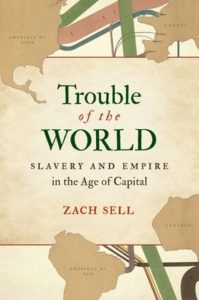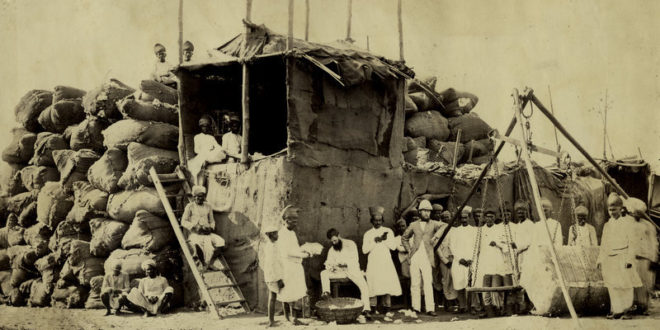Podcast: Play in new window | Download (Duration: 59:01 — 81.0MB)
 While today’s conversation centers on slavery’s influence during the forty years from the 1830s to the 1870s, we’re going to begin a bit prior to that with a journal entry by Benjamin Banneker who lived from 1731 to 1806 near Ellicott’s Mills, Maryland (now known as Ellicott City). In that entry Banneker recalled a “great locust year” in 1749, a second in 1766 during which the insects appeared to be “full as numerous as the first”, and then a third in 1783. He went on to predict that the insects “may be expected again in the year 1800 which is seventeen since their third appearance to me.”
While today’s conversation centers on slavery’s influence during the forty years from the 1830s to the 1870s, we’re going to begin a bit prior to that with a journal entry by Benjamin Banneker who lived from 1731 to 1806 near Ellicott’s Mills, Maryland (now known as Ellicott City). In that entry Banneker recalled a “great locust year” in 1749, a second in 1766 during which the insects appeared to be “full as numerous as the first”, and then a third in 1783. He went on to predict that the insects “may be expected again in the year 1800 which is seventeen since their third appearance to me.”
Of course the insects he’s speaking of are what we know as the Brood X cicadas. As Interchange is recorded in Bloomington, Indiana, where cicadas are profuse, these fascinating creatures make an appearance on today’s program as an ever-present background sound, a kind of electric undersong to the conversation.
Benjamin Banneker was a free African-American almanac author, surveyor, landowner and farmer who became known for assisting Major Andrew Ellicott in a survey that established the original borders of the District of Columbia. He also corresponded with Thomas Jefferson on the topics of slavery and racial equality.
In his new book, Trouble of the World: Slavery and Empire in the Age of Capital published by the University of North Carolina Press, our guest, Zach Sell, writes that Jefferson “envisioned the future U. S. as a white racial ethno-state and was committed to Black removal and replacement by whites…” As part of that project the Louisiana Purchase of 1803 served as a place “to experiment with his vision of Black territorial diffusion…to decrease Black population density and therefore the possibility of Black revolution against slaveholders…”
Black slavery, Black revolution, and Black emancipation inform the imaginary of imperialism and white settler colonialism and its aftermath in the 19th century. While Britain outlawed slavery in 1833, slavery set the tone, and template, for imperial conquest by means of capitalist commodity production.
In our show today we follow the course of plantation ideology as an export – US plantation overseers were sent to India to manage attempts to transform the production of staples by the introduction of Carolina rice and the plantation methodologies of cotton in order to supply Britain with the resources that were embargoed during the U.S. Civil War. We also take a look at colonization projects which created new forms of dispossession and coercion to apply to emancipated former slaves as well those of Chinese indentured labor and unemployed Lancashire cotton manufacturers.
Even as so many of these projects resulted in failure, the legacy of the slavery imaginary continued to inform the hierarchical visions and violent practices of Empire.
Our opening song is “Jaipur” by Indian Jazz guitarist Amancio D’Silva off of the 1969 album Hum Dono which features Jamaican-born saxophonist Joe Harriott. All of today’s music is from D’Silva who was influenced by American jazz guitarists Charlie Christian and Wes Montgomery.
 GUEST
GUEST
Zach Sell is visiting assistant professor of history at Drexel University. He is a scholar of slavery, empire, and colonialism in the nineteenth century, whose book, Trouble of the World: Slavery and Empire in the Age of Capital examines the terrible convergence between the expansion of U.S. slavery and the growth of the British Empire in the mid-nineteenth century.
RELATED
To Thomas Jefferson from Benjamin Banneker, 19 August 1791
Pushing Lincoln Left: Thaddeus Stevens as Revolutionary (Interchange with Bruce Levine)
Forms of Concentration: Constructing Racialized Bodies (Interchange with Dan Nemser)
Roll Jim Crow: The Racial Project of the American Tobacco Company (Interchange with Nan Enstad)
 MUSIC
MUSIC
“Jaipur” (Hum Dono) Amancio D’Silva and Joe Harriott
“Hum Dono” (Hum Dono) Amancio D’Silva and Joe Harriott
“Ganges” (Integration) Amancio D’Silva
“Integration” (Integration) Amancio D’Silva
“Cry Free” (Integration) Amancio D’Silva
ID – “Mahrani” (Integration) Amancio D’Silva
CREDITS
Producer & Host: Doug Storm
Executive Producer: Kade Young
 WFHB Bloomington Community Radio
WFHB Bloomington Community Radio


